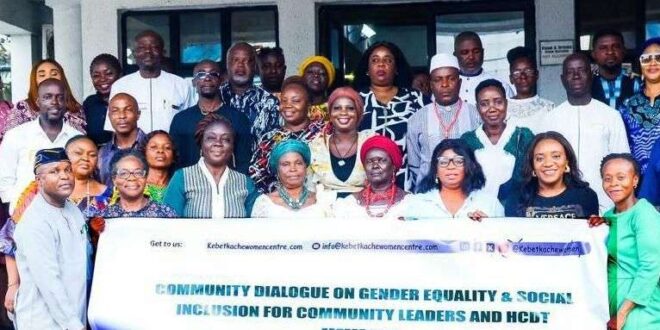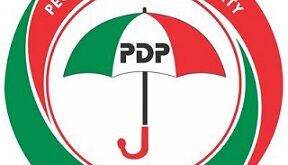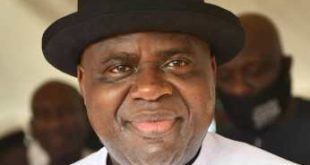By Kelechi Nwaucha
Leaders from over 20 communities in five states of the South South and South East met in Port Harcourt on Tuesday to discuss issues of social inclusion and gender equality, with regards to overall community development initiatives and opportunities, such as Host Community Development Trusts (HCDTs).
Among the chiefs, elders, women and youth leaders were members of boards of trustees, management and advisory committees of Host Community Development Trusts (HCDTs) across Abia, Imo, Rivers, Bayelsa and Akwa Ibom states.
The meeting, which was at the instance of Kebetkache Women Development and Resource Centre, with support from Oxfam, had its theme as, ‘Community Dialogue on Gender Equality and Social Inclusion for Community Leaders and HCDT Leaders.’
Executive Director of Kebetkache Women Development and Resource Centre, Dr Emem Okon, whose address was read on her behalf by Monitoring and Evaluation Officer, Jacob Iniodu, drew attention to the fact that “Gender and social inclusion in community governance structures are essential for sustainable development, community development, inclusive governance, and human rights protection.”
She said one of the major problems faced by communities is the issue of “exclusion (of some groups) from decision making processes,” adding that “decisions are taken on issues of environment, community development and economic development without due consultations with community members particularly women and girls.
“Thus, women lack opportunity to express their concerns and discuss their needs as well as contribute to decisions taken on development strategies for their communities,” she said.
Dr Okon said that Kebetkache seeks to urge community leaders, Host Community Development Trust members and other relevant community governance structure “to take more interest in gender and social inclusive initiatives in the bid to address the already existing gender disparities in their localities.
“The Host Community Development Trust are to identify implementable strategies to include women in decision making process. Oil mineral extraction has caused more problems than we know. Women are the most affected and impacted when looking at the negative impact of the extractive value chain,” she said.
Resource person at the event, Chief Constance Meju, who is also the publisher of National Point Newspaper and Board member of Kebetkache, said the meeting was aimed at getting community leaders and “those who are now inaugurated into the host community development trust to work in the interest of the community, so that there will be a transformation in the Niger Delta.”
Commenting on women inclusion in decision-making in the communities, Chief Meju said that “judging from discussions at the meeting, one can see that even the men agree that the women are not really involved as they should be in the issue of development. That means that the special things that they have, the special gifts that they have, the special energies that they should put in ensuring a better society, are not being put to use.
“My advice to the participants is that this is time for change. The Federal Government, Nigerians as a whole, have come to the realization that things are not working as they should work. But they realize that for it to work, the grassroots has to work. That’s why there’s so much emphasis on local government autonomy.
“For local government autonomy to work, community leaders have to be effective. And also, for the Niger Delta to be at peace, from all the rumblings, from environmental devastation and marginalization, then the host community development trust must work in the interests of the communities.
“So we brought them (community leaders) here to let them know that they occupy a very vital position in the societal transformation. If they can work with their hearts for the improved living in their communities. There will be a lot of developments in the Niger Delta, so we are looking forward to them going back, taking the message to their communities.
“And the place to start is from the community. Everybody must be taking into consideration and planning, planning of policies and planning of programs or projects. Getting everybody on board to think, suggest and work together, participation, engaging everybody. That is what inclusion is all about,” she said.
Chief Meju added that Kebetkache brought women and youth to the meeting “so that everybody will hear one another. Secondly, some of those women are in the trust community, trust funds. They need to understand what it is all about.
Comrade Nelson Nnanna Nwafor, Executive Director of the Foundation for Environmental Rights, Advocacy and Development, FENRAD, headquartered in Abia State, described the event as “wonderful,” adding that “The topic is very timely to build the capacity of women groups and other stakeholders in the community to understand the provisions in the host community trust, looking at the gender, equity and social inclusion.
“It creates the opportunity for the participants to understand and have an in-depth knowledge about the legal provisions in the host community trust and the areas of their involvement and participation.
“It is very important at this time that community people, both men and women, need to be empowered with enough information so as to address the issues and provisions, and the development projects in the community through the host community development trust.
“I want to urge the participants from the various communities across the Niger Delta that are here to use the knowledge that they have gained to go and sensitize their people.Build the capacity of the people to understand the provisions and the role they’re supposed to play in the areas of community development,” he said.
Goodluck Jessica Precious from Korokoro Tai, Tai Local Government Area of Rivers State, said the meeting afforded her the opportunity to learn that “when something comes into your hands as a leader, you should not hide it from your people. You should be able to communicate with them for you not to have problem. Even though it’s one naira, communicate with them, let them know the uses and the plan for that money. That way you will be at rest and your people will be at peace with you.”
She said the issue of gender equality in her area is “still not balancing, but through the Kebetkache program, we are pushing forward. Before now, women are not allowed to talk as is happening in other places. But because of Kebetkache training, women are being allowed now in some areas. For example, I’m a member of the nine-man committee of the PIA. It’s because of this training.
“Now, if they call for town hall meetings, they allow women to talk. Things are changing. So I think the training is important and it’s actually playing a vital role in our lives and in our community,” she said.
Hon Dr. Patience Ebere, from Ibaa community in Emohua Local Government Area, said “My take home is to go back to my community to give my people a reorientation on how to develop themselves. Mostly, talk to the women on how to know that charity they say begins at home, development is something that should begin in the family.”
She said this is with regards to the “training of their children, giving them good moral behaviour so that when they go out to the society they will behave well. When people are well nurtured, well trained, we will not have the issues, biases we have in the community today, mostly on the side of the youth.
“And whatever training you have as a child, you know you grow with that. And when you are well nurtured, I think the society will be a better place for everyone,” she said.
Chief Bassey Effiong Joe Ekpima, from in Unyenge Community in Mbo Local Government Area of Akwa Ibom State, chairman of the Esiteketmbo Host Community Development Trust of the Universal Energy Resources Limited, noted that “Before now, in most of the communities, you discover that women are left aside. And women don’t even attend most of the community meetings. But in my trust, my vice is a woman. She is a lawyer. We also have another member of the board of trustees who is also a lady.
“But I want to see in the near future a situation where in all the committees that make up the trust, where women feature very well. You know, because in my trust, the host community management committee and the advisory committee, there is no woman represented.
“When I heard what I’ve heard here, you know, it makes me feel guilty, and I intend, sensitizing my community women on the need for them to see themselves qualified to come out and to represent the people,” he said.
Mrs. Beatrice Parmenas Ijah from Amadaka Community in East Obolo Local Government Area of Akwa Ibom State, who is president of the women association in her community, said “Since I started having meetings with Kabetkache, I have been enlightened in so many ways. Their teachings give us the ability to stand firm as a leader and to know the needs of our followers.
“They taught us that we should continue to fight for our rights, continue to talk to them in a manner that they will understand us. Not in an harsh manner, but in a friendly and sister-brother manner that they can understand us.
“In fact, today’s teaching is all about gender equality, how we are going to cope with our disability people, women, youth, men, and women. Even the chiefs.
“I have learned so many things because the resource person elaborated the topic in such a way that what she taught us today answered so many questions that I was having in mind concerning my people, the people I am leading. As a good leader, you must be able to understand them, cooperate with them,” she said.
 PH Mundial – Port Harcourt Online Newspaper News Across The Region
PH Mundial – Port Harcourt Online Newspaper News Across The Region





